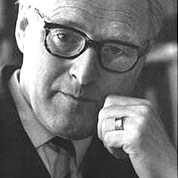Ardévol, José: Difference between revisions
No edit summary |
No edit summary |
||
| Line 1: | Line 1: | ||
[[Image: | [[Image:joseArdevol.jpg|right|thumb|250px|Jose Ardevol ]] | ||
== Biography == | == Biography == | ||
Born: <br /> | Born: 13 March 1911 <br /> | ||
Died: 7 January 1981 <br /> | |||
Country: | |||
Country: Born in Barcelona Spain, emigrated to Cuba in 1930 <br /> | |||
Studies: | Studies: | ||
| Line 15: | Line 16: | ||
-------------------------------------------- | -------------------------------------------- | ||
José Ardévol (13 March 1911, in Barcelona – 7 January 1981, in Havana) was a Cuban composer and conductor of Spanish derivation. | |||
As a child, Ardévol studied under his father, Fernando, who was a musician and conductor. He emigrated to Cuba in 1930, and from 1934 to 1952 was the director of the Orquestra de cámara de la Habana. He was a professor in Cuba from 1936 to 1951, teaching in universities in Havana and Oriente. In 1942 he founded a movement called Grupo de renovación musical, which included several of his students devoted to his aesthetic ideals. He conducted the orchestra of the government's Ministry of Education beginning in 1959. He continued teaching, working as a professor of composition at Havana Conservatory from 1965 and at the National School of Music from 1968. | |||
Ardévol's early compositions fall generally into the style of neoclassicism, but later in his life he began to explore the techniques of aleatory music and serialism. Some of his vocal works praise communism and address other political/revolutionary topics.<ref>https://en.wikipedia.org/wiki/Jos%C3%A9_Ard%C3%A9vol</ref> --> | |||
<!--== Books for Percussion == | <!--== Books for Percussion == | ||
| Line 40: | Line 44: | ||
<!-- {{DEFAULTSORT: Lastname, Firstname}} --> | <!-- {{DEFAULTSORT: Lastname, Firstname}} --> | ||
[[Category:Composers]] | [[Category:Composers]] | ||
[[Category:Cuban Composers]] | |||
[[Category:History]] | |||
[[Category:History-Composers]] | |||
[[Category:Percussion (11)]] | |||
[[Category:Percussion (12+)]] | |||
[[Category:Piano]] | |||
<!-- Don't forget to add categories, literature, instruments, history, pedagogy, sticks, etc. Also delete the Template category. To see what categories are available, see: http://www.tekpercussion.com/Special:Categories --> | <!-- Don't forget to add categories, literature, instruments, history, pedagogy, sticks, etc. Also delete the Template category. To see what categories are available, see: http://www.tekpercussion.com/Special:Categories --> | ||
Revision as of 12:11, 9 November 2025

Biography
Born: 13 March 1911
Died: 7 January 1981
Country: Born in Barcelona Spain, emigrated to Cuba in 1930
Studies:
Teachers:
Website:
José Ardévol (13 March 1911, in Barcelona – 7 January 1981, in Havana) was a Cuban composer and conductor of Spanish derivation.
As a child, Ardévol studied under his father, Fernando, who was a musician and conductor. He emigrated to Cuba in 1930, and from 1934 to 1952 was the director of the Orquestra de cámara de la Habana. He was a professor in Cuba from 1936 to 1951, teaching in universities in Havana and Oriente. In 1942 he founded a movement called Grupo de renovación musical, which included several of his students devoted to his aesthetic ideals. He conducted the orchestra of the government's Ministry of Education beginning in 1959. He continued teaching, working as a professor of composition at Havana Conservatory from 1965 and at the National School of Music from 1968.
Ardévol's early compositions fall generally into the style of neoclassicism, but later in his life he began to explore the techniques of aleatory music and serialism. Some of his vocal works praise communism and address other political/revolutionary topics.[1] -->
Works for Percussion
Study in the form of Prelude and Fugue for 14 percussionists and piano (1933)
Suite, para 30 instrumentos de percusion, fricción, y silbido for 14 percussionists and piano (1934)
Preludio a 11 for 10 percussionists and piano (1942)
References